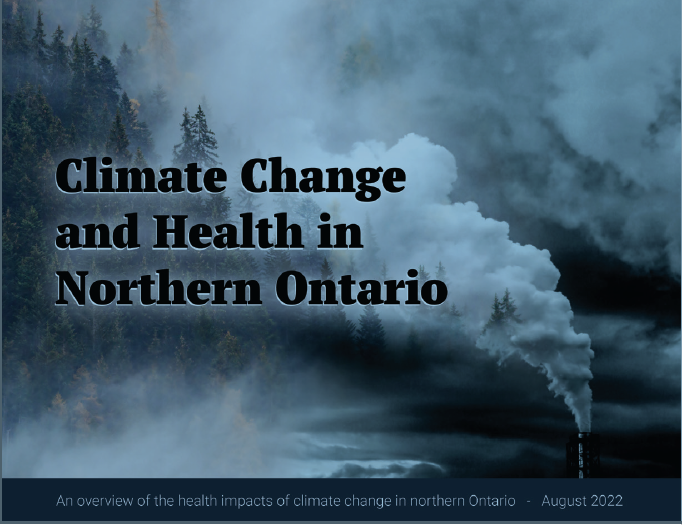Climate Change and Health in Northern Ontario
An overview of the health impacts of climate change in northern Ontario - August 2022 (PDF Report)
Climate change affecting Canadians’ health says new Federal report
Report being used by Timiskaming Health Unit to gain knowledge of how climate change impacts the health of northern Ontarians
A new report issued by Health Canada explains how the health impacts of climate change are being felt across the country.
The 768-page report, titled Health of Canadians in a Changing Climate: Advancing Our Knowledge for Action shows climate change is already affecting the health of Canadians and will continue to result in injury, illness, and death unless meaningful action is taken.
One of the biggest concerns, according to researchers is “climate change will continue to stress health systems because of increasing disasters and emergencies which threaten to overwhelm their ability to protect Canadians and their communities”.
The report builds on previous scientific studies and includes information on health risks so that government decision makers, health practitioners, researchers, and individual Canadians can take measures to protect Canadians’ health now and in the future.
Timiskaming Health Unit is using the assessment results to inform local work and policy development which will ultimately help prioritize action to reduce climate change impacts on the health of those living in northern Ontario.
The full report can be found on the Publications and Reports page of the Natural Resources Canada website or at www.changingclimate.ca.
Additional Information about the Report
Below you will find all nine key findings of the Health of Canadians in a Changing Climate Report:
- Climate change is already negatively impacting the health of Canadians.
- Health risks will increase as warming continues, and the greater the warming, the greater the threats to health.
- Some Canadians are affected more severely by climate change, as exposure and sensitivity to hazards and the ability to take protective measures varies across and within populations and communities.
- The effects of climate change on health systems in Canada — for example, damage to health facilities and disruptions to health services and operations — are already evident and will increase in the absence of strong adaptation measures.
- Efforts to prepare for climate change are known to reduce risks and protect health. We must take action now.
- The health impacts of climate change on First Nations, Inuit, and Métis peoples are far-reaching, with disproportionate impacts on their communities, including food and water security and safety, air quality, infrastructure, personal safety, mental health and wellness, livelihoods, culture, and identity.
- To successfully protect all Canadians from the health impacts of climate change, decision makers must pursue adaptation actions that are inclusive and equitable and consider the needs of racialized, marginalized, and low-income populations.
- Increased efforts to reduce greenhouse gas emissions are required to help protect the health of Canadians.
- Reducing greenhouse gas emissions can provide very large and immediate health co-benefits to Canadians.
Please contact Maria McLean for further information: mcleanm@timiskaminghu.com
20230110/mm:nd